动词时态(八种时态)
图片预览

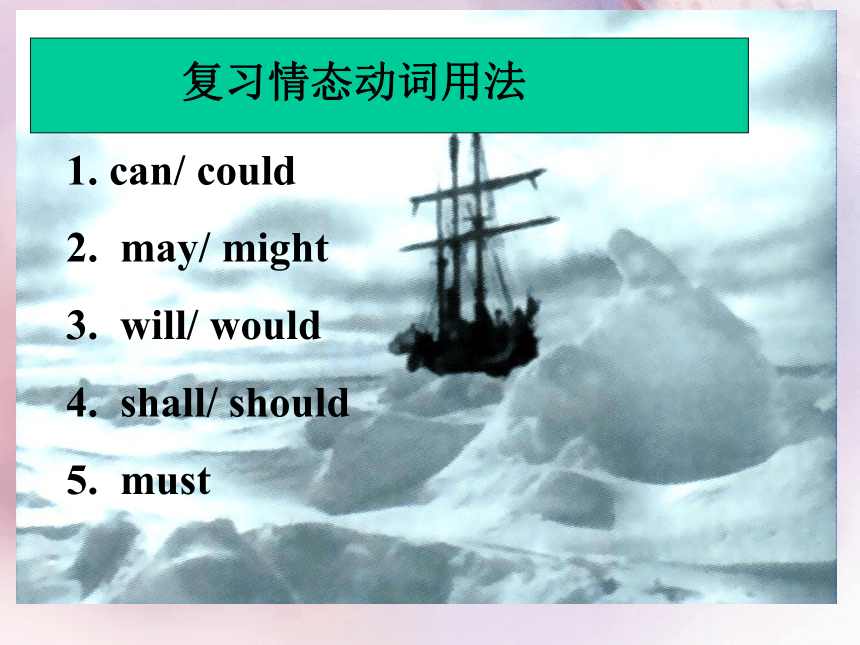
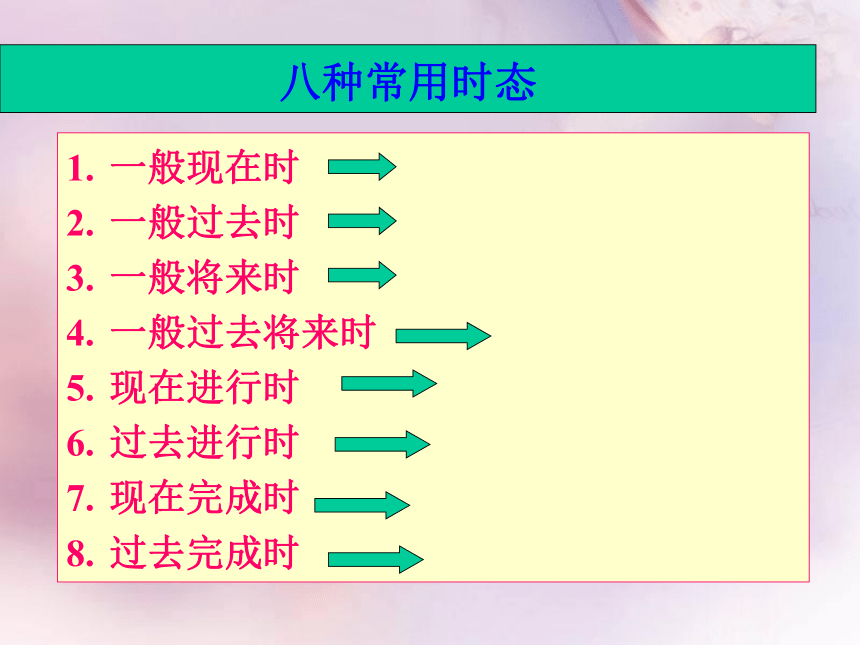
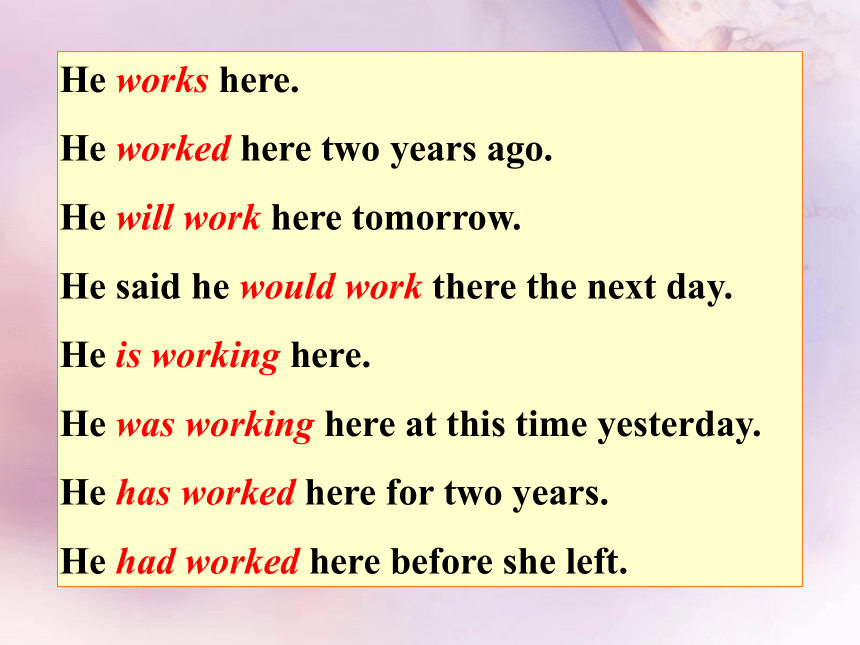
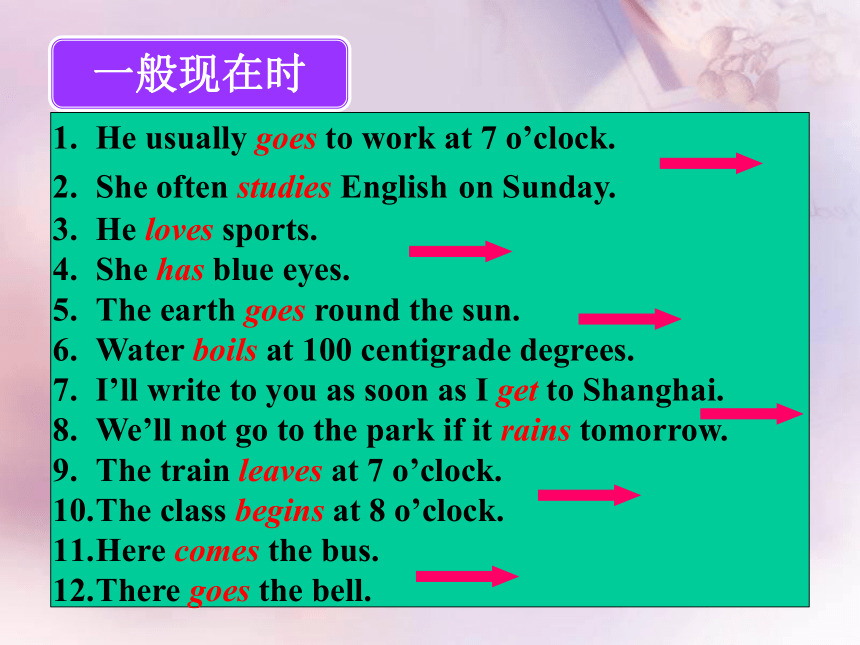
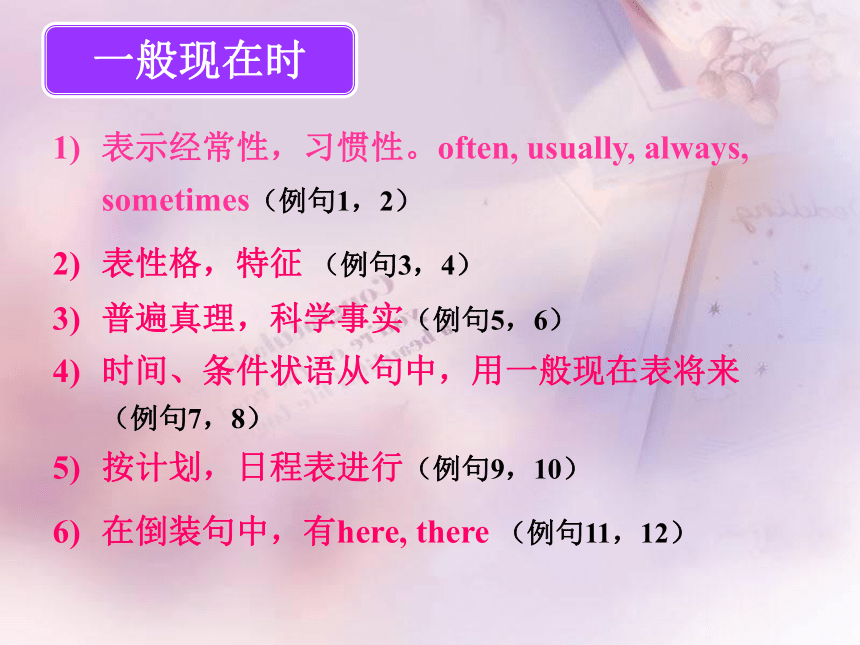
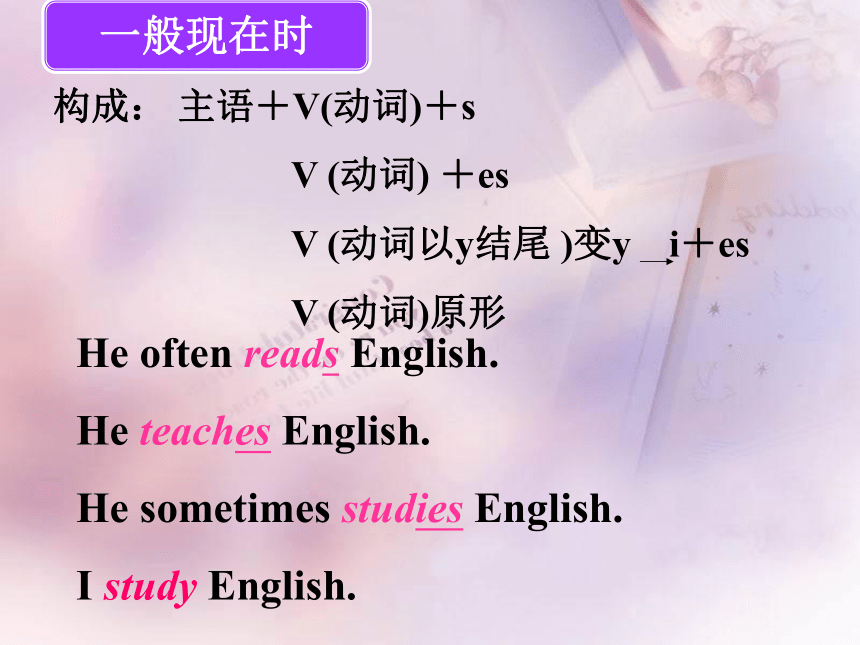
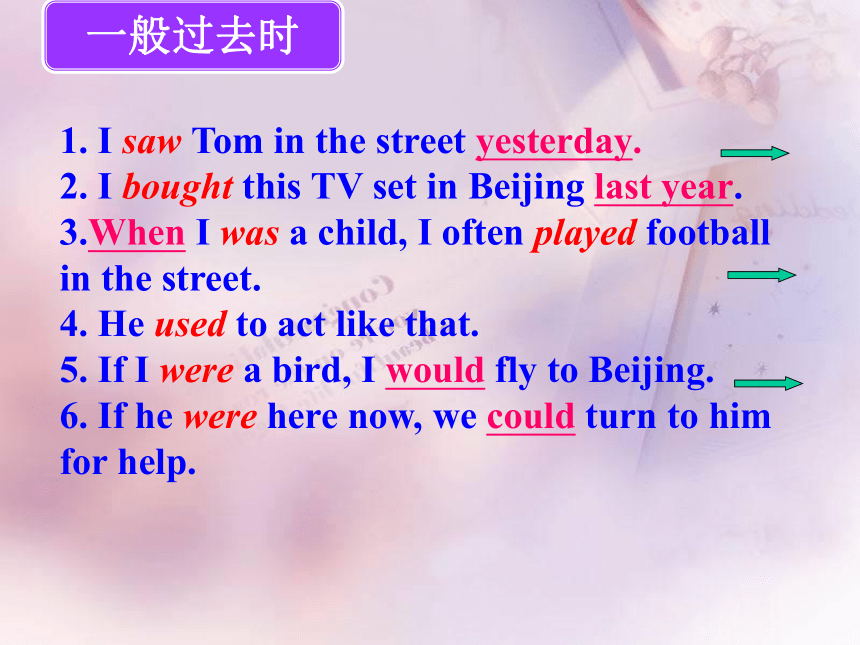
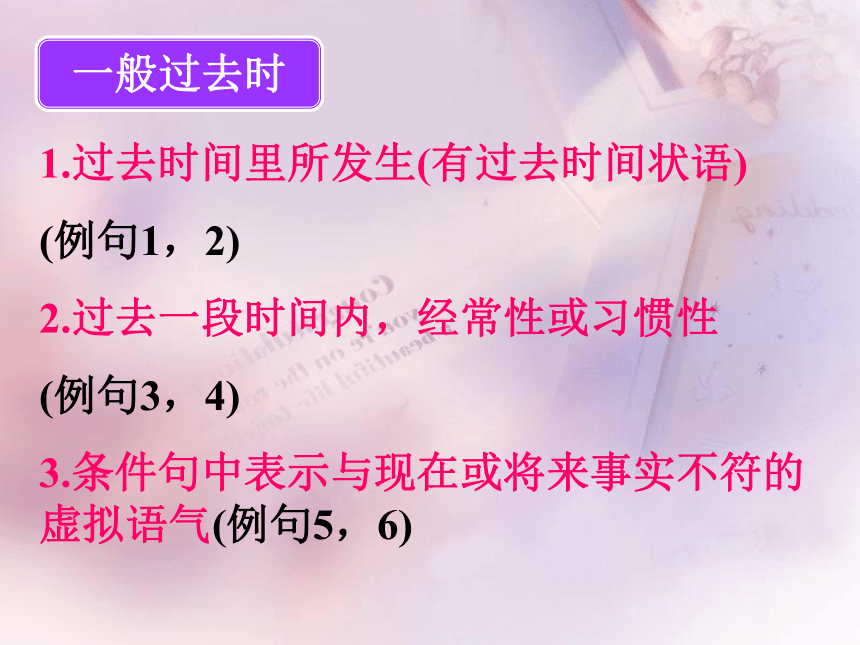
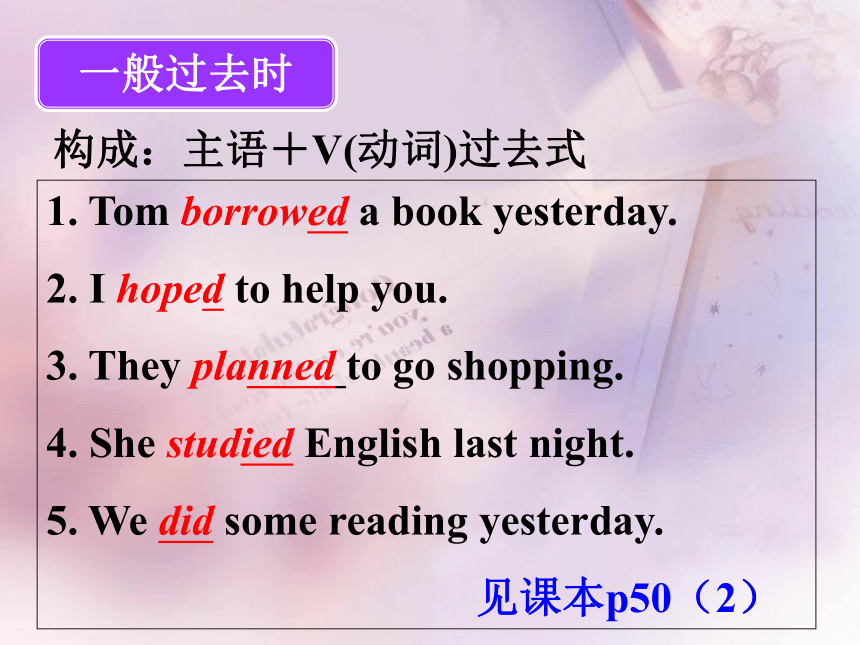
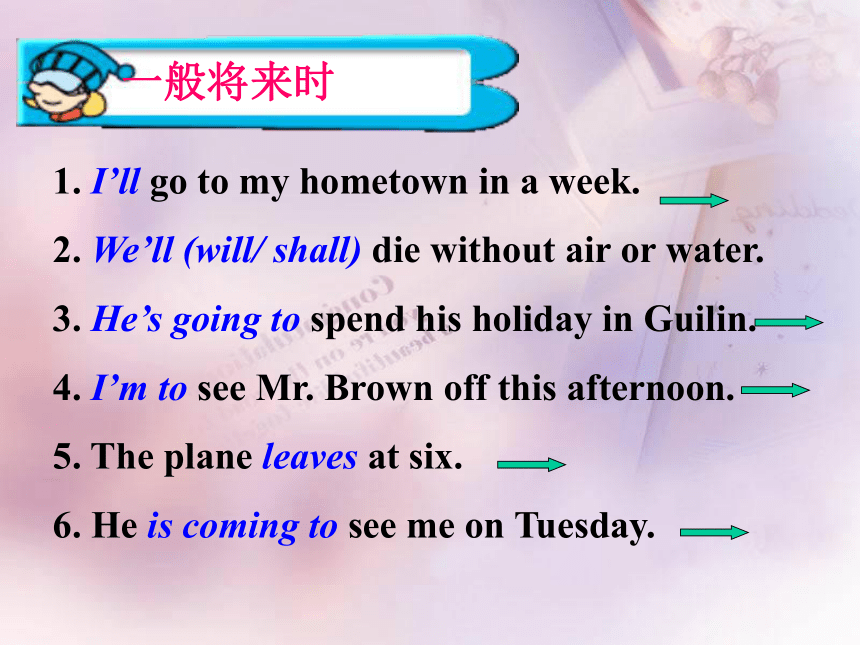

文档简介
(共38张PPT)
时态语态
复习情态动词用法
can/ could
may/ might
will/ would
shall/ should
must
一般现在时
一般过去时
一般将来时
一般过去将来时
现在进行时
过去进行时
现在完成时
过去完成时
八种常用时态
He works here.
He worked here two years ago.
He will work here tomorrow.
He said he would work there the next day.
He is working here.
He was working here at this time yesterday.
He has worked here for two years.
He had worked here before she left.
一般现在时
He usually goes to work at 7 o’clock.
She often studies English on Sunday.
He loves sports.
She has blue eyes.
The earth goes round the sun.
Water boils at 100 centigrade degrees.
I’ll write to you as soon as I get to Shanghai.
We’ll not go to the park if it rains tomorrow.
The train leaves at 7 o’clock.
The class begins at 8 o’clock.
Here comes the bus.
There goes the bell.
表示经常性,习惯性。often, usually, always, sometimes(例句1,2)
表性格,特征 (例句3,4)
普遍真理,科学事实(例句5,6)
时间、条件状语从句中,用一般现在表将来(例句7,8)
按计划,日程表进行(例句9,10)
在倒装句中,有here, there (例句11,12)
一般现在时
一般现在时
构成: 主语+V(动词)+s
V (动词) +es
V (动词以y结尾 )变y i+es
V (动词)原形
He often reads English.
He teaches English.
He sometimes studies English.
I study English.
见课本p48 (2)
一般过去时
1. I saw Tom in the street yesterday.
2. I bought this TV set in Beijing last year.
3.When I was a child, I often played football in the street.
4. He used to act like that.
5. If I were a bird, I would fly to Beijing.
6. If he were here now, we could turn to him for help.
一般过去时
1.过去时间里所发生(有过去时间状语)
(例句1,2)
2.过去一段时间内,经常性或习惯性
(例句3,4)
3.条件句中表示与现在或将来事实不符的虚拟语气(例句5,6)
一般过去时
构成:主语+V(动词)过去式
1. Tom borrowed a book yesterday.
2. I hoped to help you.
3. They planned to go shopping.
4. She studied English last night.
5. We did some reading yesterday.
见课本p50(2)
一般将来时
1. I’ll go to my hometown in a week.
2. We’ll (will/ shall) die without air or water.
3. He’s going to spend his holiday in Guilin.
4. I’m to see Mr. Brown off this afternoon.
5. The plane leaves at six.
6. He is coming to see me on Tuesday.
1.在将来时间发生的动作(接将来时间)(例句1)
2.be going to +不定式,表示将来(例句3)
3.be +不定式(to do)表将来,按计划或安排(例句4)
4.某些动词(come/ go/ leave等)可用一般现在时表将来(例句5)
5.某些动词(come/arrive/go等)可用现在进行时表将来(例句6)
一般将来时
一般将来时
构成:主语+will/ shall +V(动词)原形
I will go to my hometown in a week.
We shall come to see you every Sunday.
I’ll be 20 years old next year.
We shan’t be free tonight.
We’ll be free tonight.
过去将来时
概念:过去某时间来看将要发生的动作。
构成:主语+would/ should +V(动词)原形
He said he would go to Shanghai for the holiday.
He said he was going to cry.
We were to finish the job in three hours.
现在进行时
1. We are waiting for you now.
2. Mr. Green is writing another novel.
3. What are you doing here in Beijing
4. He is leaving for Beijing this evening.
5. I am liking you.
错误
现在进行时
1. 表说话时正在进行。(例句1)
2. 现阶段正在进行。(例句2, 3)
3. 现在进行时表将来。(例句4)
4. 表感觉,感情等的词不用进行时。(例句5)
现在进行时
构成:主语+am/ is/ are +Ving
1. They are studying English.
2. She is having a holiday.
3. He is planning a trip to England.
过去进行时
构成:主语+was/ were +V-ing
1. They were studying English at this time yesterday.
2. She was having a holiday when I went to visit her.
3. He was planning a trip to England when I met him.
概念:表示过去某时正在进行的状态或动作。
构成:
主语+助动词have (has) + V-ed(动词的过去分词)
注:has 用于第三人称单数,
have 用于其他所有人称。
现在完成时
① I have never heard of that before.
② Have you ever ridden a horse
③ She has already finished the work.
④ Have you milked the cow yet Yes, I have done that already.
⑤ I’ve just lost my science book.
有时没有时间状语;多是一般疑问句。
现在完成时
① I haven’t seen her these days.
② She has learnt English for 3 years.
③ They have lived here since 1990.
④ What has happened to the USA in the last 350 years
现在完成时
用法:
(1)现在完成时表示过去发生或已经完成的某一动作对现在造成的影响或结果。通常与时间副词just,already, before, yet, never, ever等状语连用。
(2) 现在完成时表示过去已经开始,持续到现在,也许还会持续下去的动作或状态。如:for和since,以及 so far, now, today, this week(month, year) 等。
现在完成时
概念:表示过去的过去
1.By the end of last year we had built five new houses.
2.I had learnt 5000 words before I entered the university.
3.She said (that) she had never been to Paris.
4.By the time he was twelve, Edison had began to make a living by himself.
过去完成时
-----------|----------------|--------------------|---->
那时以前 那时 现在
其结构是:had + 过去分词
一般过去时与现在完成时之比较
1. I saw this film yesterday. (强调看的动作发生过了。)
I have seen this film.
(强调对现在的影响,电影的内容已经知道了。)
2. She has returned from Paris. (她已从巴黎回来了。)
She returned yesterday. (她是昨天回来了。)
3. He has been in the League for three years.
(在团内的状态可延续)
He joined the League three years ago.
( 三年前入团,joined为短暂行为。)
注意:句子中如有过去时的时间副词(如 yesterday, last week, in 1960)时,不能使用现在完成时,要用过去时。例如:
(错)Tom has written a letter to his parents last night.
(对)Tom wrote a letter to his parents last night.
被动语态
1. Many people speak English.
English is spoken by many people.
2. A forefinger made a speech.
The speech was made by a foreigner.
3.They will build a new school in that village soon.
A new school will be built in that village soon.
4. They have set up a lot of buildings in the last few years.
A lot of new buildings have been set up in the last few years.
5. He can repair the lock in three day.
The lock can be repaired in three days.
1. 表示感觉、变化或保持等意义的系动词feel, look, smell, taste, sound, turn, prove, stay, get等用主动形式表被动意义。
The water felt cool when I jumped into the pool for morning exercise.
二、关于被动语态的几种特殊用法
2. 由“get+过去分词”构成的被动语态
被动语态除由“be+过去分词”构成以外,也可由“get+过去分词”构成,表示:
(1)给自己做事(get dressed);
(2)设法做到自己称心的事(get elected);
(3)由于客观原因遇到不称心的事(get burned);
(4)表示命令(Get washed!去洗吧!)。
二、关于被动语态的几种特殊用法
典型例题
1) Mary ___ a dress when she cut her finger.
A. made B. is making C. was making D. makes
答案C.
割伤手指是已发生的事情,应用过去时。同时,when表时间的同时性,"玛丽在做衣服时"提供事情发生的背景,因此用过去进行时。
2) As she ___ the newspaper, Granny ___ asleep.
A. read; was falling B. was reading; fell
C. was reading; was falling D. read; fell
答案B.
句中的as = when, while,意为“当……之时”。描述一件事发生的背景时,用过去进行;一个长时动作发生的时候,另一个短时动作发生。句意为 "在她看报纸时,奶奶睡着了。"句中的 fell (fall的过去时),是系动词,后跟形容词,如:fall sick。
1. — Look! How wonderful my car is! Oh, Jack. What are you thinking about Don’t you like it
— I’m sorry I ______ any remark about it in time. I certainly think it’s smart.
A. wasn’t making B. don’t make
C. won’t make D. didn’t make
2. To find the street where I lived in my childhood is no easy task because the city ______ so rapidly all these years.
A. is changing B. has changed
C. will have changed D. will change
3. He ______ quite well, but he hasn’t had time to swim since this summer.
A. will swim B. have swum C. swam D. swims
4. Jimmy said that he would come to pick me up, but he ____by now.
A. hasn’t turned up B. doesn’t turn up
C. won’t turn up D. hadn’t turned up
5. I’m terribly sorry for being late, but I _____ the wrong bus.
A. catch B. had caught C. caught D. catching
7. The truth, sir, is that the old man _______ across the road when my car hit him.
A. was to walk B. had been walking
C. walked D. was walking
8. I really don’t think Rose will be upset, but I will go and see her in case she _____.
A. is B. does C. will be D. has been
9. The computers made by our company sell best, but several years ago no one could have imagined the role in the markets that they _________.
A. were playing B. were to play
C. had played D. played
10. — Kate is in hospital.
— Oh, really I _______. ________ visit her.
A. didn’t know; I’ll go and B. don’t know; I’ll go and
C. don’t know; I’m going to D. didn’t know; I’m going to
11. — Where _______ the guidebook I can’t see it anywhere.
— I _______ it right here, but now it’s gone.
A. did you put; have put B. had you put; have put
C. have you put; put D. were you putting; put
14. — Do you live in this city
— No, we ______ it for holidays.
A. just visit B. just visited C. are just visiting D. have visited
15. — How is the old man now
— Sorry, he ______ though they did all they could to save him.
A. was dead B. had died C. has been dead D. died
16.The lake will be further polluted unless some measures ______.
A. will be taken B. are taken C. were taken D. had been taken
17. I’m afraid it will be two months ______.
A. when I come back B. when I’ll come back
C. before I come back D. before I’ll come back
18.The workers _____ busily when the boss came to look for something he ______ in the office.
A. had worked, had left B. were working ; had left
C. working ; had left D. had worked; left
21.The notice ______ “No smoking”.
A. is told B. reads C. tells D. is read
1. The old man _____ two days after he had been sent to hospital.
A. died B. would die C. had died D. has died
2. Old McDonald gave up smoking for a while, but soon ______ to his old ways.
A. returned B. returns C. was returning D. had returned
3. I _____ my son _____ a doctor, but he wasn’t good enough at science.
A. hoped; would become B. had hoped; would become
C. had hoped; will become D. hope; will become
4. I _____ to take a good holiday this year, but I wasn’t able to get away.
A. hope B. have hoped C. had hoped D. hoped
5. Helen _____ her key in the office so she had to wait until her husband _____ home.
A. has left; comes B. left; had come
C. had left; came D. had left; would come
1.He stepped into the office, _____ down and began to fill in the forms.
A. sitting B. to sit C. sat D. having it
2.She said she would telephone but we _____from her so far.
A.haven’t heard B.didn’t hear C.hadn’t heard D.won’t hear
3.When I got to the cinema, the film____for ten minutes.
A.has begun B.had begun C.had been on D.was
4.I’ll go with you as soon as I____my homework.
A.will finish B.finish C.am finishing D.finished
5.If it_____tomorrow,I won’t go to the cinema.
A.will rain B.rains C.is raining D.rained
6.She is going to be a nurse when she_____up.
A.is going to grow B.grows C.growing D.grew
7.“这本书我已经买了三个月了。”,下列哪一句不对?
A.I have had this book for three months.
B.I have bought this book for three months.
C.I bought this book three months ago.
D.It is three months since I bought this book.
8.— Come in, Peter, I want to show you something.
— Oh, how nice of you! I _____ you _____ to bring me a gift.
A.never think; are going B.never thought; were going
C.didn’t think; were going D.had’t thought; were going
9.When I was at college I _____ three foreign languages,but I _____ all except for a few words of each.
A.spoke;had forgotten B.spoke;have forgotten
C.had spoken;had forgotten D.had spoken;have forgotten
10.The police found that the house _____ and a lot of things ____.
A.has broken into; has been stolen
B.had broken into; had been stolen
C.has been broken into; stolen
D.had been broken into; stolen
11.The volleyball match will be put off if it____.
A. will rain B. rains C. rained D. is raining
12.Mary _____ a dress when she cut her finger.
A. made B. is making C. was making D. makes
13.The students _____ busily when Miss Brown went to get a book she _____ in the office.
A. had written; left B. were writing; has left
C. had written; had left D. were writing; had left
14. — Have you moved into the new house
— No yet, the rooms _____,
A. are being painted B. are painting
C. are painted D. are being painting
15. — We haven’t heard from Jane for a long time.
— What do you suppose ____ to her
A. was happening B. to happen
C. has happened D. having happened
16. — Do you know our town at all
— No, this is the first time I _____ here.
A. was B. have been C. came D. am coming
17. — We could have walked to the station.It was so near.
— Yes, A taxi _____ at all necessary.
A. wasn’t B. hadn’t been C. wouldn’t be D. won’t be
18.If city noises _____ from increasing, people _____ shout to be heard even at the dinner table 20 years from now.
A. are not kept; will have to B. are not kept; have to
C. do not keep; will have to D. do not keep; have to
19.Tom _____ into the house when no one _____.
A. slipped; was looking B. had slipped; looked
C. slipped; had looked D. was slippping; looked
20.The last time I _____ Jane she ____ cotton in the fields.
A. had seen; was picking B. saw; picking
C. had seen; picked D. saw; was picking
时态语态
复习情态动词用法
can/ could
may/ might
will/ would
shall/ should
must
一般现在时
一般过去时
一般将来时
一般过去将来时
现在进行时
过去进行时
现在完成时
过去完成时
八种常用时态
He works here.
He worked here two years ago.
He will work here tomorrow.
He said he would work there the next day.
He is working here.
He was working here at this time yesterday.
He has worked here for two years.
He had worked here before she left.
一般现在时
He usually goes to work at 7 o’clock.
She often studies English on Sunday.
He loves sports.
She has blue eyes.
The earth goes round the sun.
Water boils at 100 centigrade degrees.
I’ll write to you as soon as I get to Shanghai.
We’ll not go to the park if it rains tomorrow.
The train leaves at 7 o’clock.
The class begins at 8 o’clock.
Here comes the bus.
There goes the bell.
表示经常性,习惯性。often, usually, always, sometimes(例句1,2)
表性格,特征 (例句3,4)
普遍真理,科学事实(例句5,6)
时间、条件状语从句中,用一般现在表将来(例句7,8)
按计划,日程表进行(例句9,10)
在倒装句中,有here, there (例句11,12)
一般现在时
一般现在时
构成: 主语+V(动词)+s
V (动词) +es
V (动词以y结尾 )变y i+es
V (动词)原形
He often reads English.
He teaches English.
He sometimes studies English.
I study English.
见课本p48 (2)
一般过去时
1. I saw Tom in the street yesterday.
2. I bought this TV set in Beijing last year.
3.When I was a child, I often played football in the street.
4. He used to act like that.
5. If I were a bird, I would fly to Beijing.
6. If he were here now, we could turn to him for help.
一般过去时
1.过去时间里所发生(有过去时间状语)
(例句1,2)
2.过去一段时间内,经常性或习惯性
(例句3,4)
3.条件句中表示与现在或将来事实不符的虚拟语气(例句5,6)
一般过去时
构成:主语+V(动词)过去式
1. Tom borrowed a book yesterday.
2. I hoped to help you.
3. They planned to go shopping.
4. She studied English last night.
5. We did some reading yesterday.
见课本p50(2)
一般将来时
1. I’ll go to my hometown in a week.
2. We’ll (will/ shall) die without air or water.
3. He’s going to spend his holiday in Guilin.
4. I’m to see Mr. Brown off this afternoon.
5. The plane leaves at six.
6. He is coming to see me on Tuesday.
1.在将来时间发生的动作(接将来时间)(例句1)
2.be going to +不定式,表示将来(例句3)
3.be +不定式(to do)表将来,按计划或安排(例句4)
4.某些动词(come/ go/ leave等)可用一般现在时表将来(例句5)
5.某些动词(come/arrive/go等)可用现在进行时表将来(例句6)
一般将来时
一般将来时
构成:主语+will/ shall +V(动词)原形
I will go to my hometown in a week.
We shall come to see you every Sunday.
I’ll be 20 years old next year.
We shan’t be free tonight.
We’ll be free tonight.
过去将来时
概念:过去某时间来看将要发生的动作。
构成:主语+would/ should +V(动词)原形
He said he would go to Shanghai for the holiday.
He said he was going to cry.
We were to finish the job in three hours.
现在进行时
1. We are waiting for you now.
2. Mr. Green is writing another novel.
3. What are you doing here in Beijing
4. He is leaving for Beijing this evening.
5. I am liking you.
错误
现在进行时
1. 表说话时正在进行。(例句1)
2. 现阶段正在进行。(例句2, 3)
3. 现在进行时表将来。(例句4)
4. 表感觉,感情等的词不用进行时。(例句5)
现在进行时
构成:主语+am/ is/ are +Ving
1. They are studying English.
2. She is having a holiday.
3. He is planning a trip to England.
过去进行时
构成:主语+was/ were +V-ing
1. They were studying English at this time yesterday.
2. She was having a holiday when I went to visit her.
3. He was planning a trip to England when I met him.
概念:表示过去某时正在进行的状态或动作。
构成:
主语+助动词have (has) + V-ed(动词的过去分词)
注:has 用于第三人称单数,
have 用于其他所有人称。
现在完成时
① I have never heard of that before.
② Have you ever ridden a horse
③ She has already finished the work.
④ Have you milked the cow yet Yes, I have done that already.
⑤ I’ve just lost my science book.
有时没有时间状语;多是一般疑问句。
现在完成时
① I haven’t seen her these days.
② She has learnt English for 3 years.
③ They have lived here since 1990.
④ What has happened to the USA in the last 350 years
现在完成时
用法:
(1)现在完成时表示过去发生或已经完成的某一动作对现在造成的影响或结果。通常与时间副词just,already, before, yet, never, ever等状语连用。
(2) 现在完成时表示过去已经开始,持续到现在,也许还会持续下去的动作或状态。如:for和since,以及 so far, now, today, this week(month, year) 等。
现在完成时
概念:表示过去的过去
1.By the end of last year we had built five new houses.
2.I had learnt 5000 words before I entered the university.
3.She said (that) she had never been to Paris.
4.By the time he was twelve, Edison had began to make a living by himself.
过去完成时
-----------|----------------|--------------------|---->
那时以前 那时 现在
其结构是:had + 过去分词
一般过去时与现在完成时之比较
1. I saw this film yesterday. (强调看的动作发生过了。)
I have seen this film.
(强调对现在的影响,电影的内容已经知道了。)
2. She has returned from Paris. (她已从巴黎回来了。)
She returned yesterday. (她是昨天回来了。)
3. He has been in the League for three years.
(在团内的状态可延续)
He joined the League three years ago.
( 三年前入团,joined为短暂行为。)
注意:句子中如有过去时的时间副词(如 yesterday, last week, in 1960)时,不能使用现在完成时,要用过去时。例如:
(错)Tom has written a letter to his parents last night.
(对)Tom wrote a letter to his parents last night.
被动语态
1. Many people speak English.
English is spoken by many people.
2. A forefinger made a speech.
The speech was made by a foreigner.
3.They will build a new school in that village soon.
A new school will be built in that village soon.
4. They have set up a lot of buildings in the last few years.
A lot of new buildings have been set up in the last few years.
5. He can repair the lock in three day.
The lock can be repaired in three days.
1. 表示感觉、变化或保持等意义的系动词feel, look, smell, taste, sound, turn, prove, stay, get等用主动形式表被动意义。
The water felt cool when I jumped into the pool for morning exercise.
二、关于被动语态的几种特殊用法
2. 由“get+过去分词”构成的被动语态
被动语态除由“be+过去分词”构成以外,也可由“get+过去分词”构成,表示:
(1)给自己做事(get dressed);
(2)设法做到自己称心的事(get elected);
(3)由于客观原因遇到不称心的事(get burned);
(4)表示命令(Get washed!去洗吧!)。
二、关于被动语态的几种特殊用法
典型例题
1) Mary ___ a dress when she cut her finger.
A. made B. is making C. was making D. makes
答案C.
割伤手指是已发生的事情,应用过去时。同时,when表时间的同时性,"玛丽在做衣服时"提供事情发生的背景,因此用过去进行时。
2) As she ___ the newspaper, Granny ___ asleep.
A. read; was falling B. was reading; fell
C. was reading; was falling D. read; fell
答案B.
句中的as = when, while,意为“当……之时”。描述一件事发生的背景时,用过去进行;一个长时动作发生的时候,另一个短时动作发生。句意为 "在她看报纸时,奶奶睡着了。"句中的 fell (fall的过去时),是系动词,后跟形容词,如:fall sick。
1. — Look! How wonderful my car is! Oh, Jack. What are you thinking about Don’t you like it
— I’m sorry I ______ any remark about it in time. I certainly think it’s smart.
A. wasn’t making B. don’t make
C. won’t make D. didn’t make
2. To find the street where I lived in my childhood is no easy task because the city ______ so rapidly all these years.
A. is changing B. has changed
C. will have changed D. will change
3. He ______ quite well, but he hasn’t had time to swim since this summer.
A. will swim B. have swum C. swam D. swims
4. Jimmy said that he would come to pick me up, but he ____by now.
A. hasn’t turned up B. doesn’t turn up
C. won’t turn up D. hadn’t turned up
5. I’m terribly sorry for being late, but I _____ the wrong bus.
A. catch B. had caught C. caught D. catching
7. The truth, sir, is that the old man _______ across the road when my car hit him.
A. was to walk B. had been walking
C. walked D. was walking
8. I really don’t think Rose will be upset, but I will go and see her in case she _____.
A. is B. does C. will be D. has been
9. The computers made by our company sell best, but several years ago no one could have imagined the role in the markets that they _________.
A. were playing B. were to play
C. had played D. played
10. — Kate is in hospital.
— Oh, really I _______. ________ visit her.
A. didn’t know; I’ll go and B. don’t know; I’ll go and
C. don’t know; I’m going to D. didn’t know; I’m going to
11. — Where _______ the guidebook I can’t see it anywhere.
— I _______ it right here, but now it’s gone.
A. did you put; have put B. had you put; have put
C. have you put; put D. were you putting; put
14. — Do you live in this city
— No, we ______ it for holidays.
A. just visit B. just visited C. are just visiting D. have visited
15. — How is the old man now
— Sorry, he ______ though they did all they could to save him.
A. was dead B. had died C. has been dead D. died
16.The lake will be further polluted unless some measures ______.
A. will be taken B. are taken C. were taken D. had been taken
17. I’m afraid it will be two months ______.
A. when I come back B. when I’ll come back
C. before I come back D. before I’ll come back
18.The workers _____ busily when the boss came to look for something he ______ in the office.
A. had worked, had left B. were working ; had left
C. working ; had left D. had worked; left
21.The notice ______ “No smoking”.
A. is told B. reads C. tells D. is read
1. The old man _____ two days after he had been sent to hospital.
A. died B. would die C. had died D. has died
2. Old McDonald gave up smoking for a while, but soon ______ to his old ways.
A. returned B. returns C. was returning D. had returned
3. I _____ my son _____ a doctor, but he wasn’t good enough at science.
A. hoped; would become B. had hoped; would become
C. had hoped; will become D. hope; will become
4. I _____ to take a good holiday this year, but I wasn’t able to get away.
A. hope B. have hoped C. had hoped D. hoped
5. Helen _____ her key in the office so she had to wait until her husband _____ home.
A. has left; comes B. left; had come
C. had left; came D. had left; would come
1.He stepped into the office, _____ down and began to fill in the forms.
A. sitting B. to sit C. sat D. having it
2.She said she would telephone but we _____from her so far.
A.haven’t heard B.didn’t hear C.hadn’t heard D.won’t hear
3.When I got to the cinema, the film____for ten minutes.
A.has begun B.had begun C.had been on D.was
4.I’ll go with you as soon as I____my homework.
A.will finish B.finish C.am finishing D.finished
5.If it_____tomorrow,I won’t go to the cinema.
A.will rain B.rains C.is raining D.rained
6.She is going to be a nurse when she_____up.
A.is going to grow B.grows C.growing D.grew
7.“这本书我已经买了三个月了。”,下列哪一句不对?
A.I have had this book for three months.
B.I have bought this book for three months.
C.I bought this book three months ago.
D.It is three months since I bought this book.
8.— Come in, Peter, I want to show you something.
— Oh, how nice of you! I _____ you _____ to bring me a gift.
A.never think; are going B.never thought; were going
C.didn’t think; were going D.had’t thought; were going
9.When I was at college I _____ three foreign languages,but I _____ all except for a few words of each.
A.spoke;had forgotten B.spoke;have forgotten
C.had spoken;had forgotten D.had spoken;have forgotten
10.The police found that the house _____ and a lot of things ____.
A.has broken into; has been stolen
B.had broken into; had been stolen
C.has been broken into; stolen
D.had been broken into; stolen
11.The volleyball match will be put off if it____.
A. will rain B. rains C. rained D. is raining
12.Mary _____ a dress when she cut her finger.
A. made B. is making C. was making D. makes
13.The students _____ busily when Miss Brown went to get a book she _____ in the office.
A. had written; left B. were writing; has left
C. had written; had left D. were writing; had left
14. — Have you moved into the new house
— No yet, the rooms _____,
A. are being painted B. are painting
C. are painted D. are being painting
15. — We haven’t heard from Jane for a long time.
— What do you suppose ____ to her
A. was happening B. to happen
C. has happened D. having happened
16. — Do you know our town at all
— No, this is the first time I _____ here.
A. was B. have been C. came D. am coming
17. — We could have walked to the station.It was so near.
— Yes, A taxi _____ at all necessary.
A. wasn’t B. hadn’t been C. wouldn’t be D. won’t be
18.If city noises _____ from increasing, people _____ shout to be heard even at the dinner table 20 years from now.
A. are not kept; will have to B. are not kept; have to
C. do not keep; will have to D. do not keep; have to
19.Tom _____ into the house when no one _____.
A. slipped; was looking B. had slipped; looked
C. slipped; had looked D. was slippping; looked
20.The last time I _____ Jane she ____ cotton in the fields.
A. had seen; was picking B. saw; picking
C. had seen; picked D. saw; was picking
